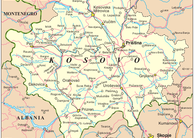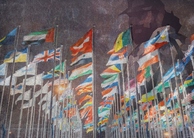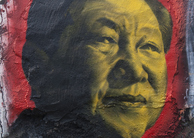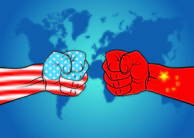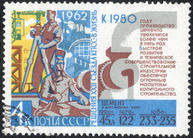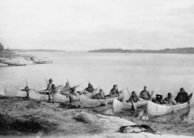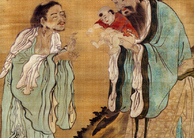|
Nationalism (tagged articles)
The keyword Nationalism is tagged in the following 36 articles.
2022, Vol. 14 No. 03
This paper explores the complexity of Whitman’s Nationalism and, with reference to Leaves of Grass (1856), examines the apparent paradox between Whitman’s poetry of love and recognition and his imperialistic impulses. This paper draws... Read Article »
2021, Vol. 13 No. 04
While the history of ethnography in Russia dates back to the Kievan Rus era, modern ethnographic production in Russia developed in the 17th century and expanded during the late 18th and early 19th centuries as interest in folktales and in the lives... Read Article »
2021, Vol. 13 No. 02
This article explores the way in which Quentin Tarantino’s Inglorious Basterds challenges the myth of the American hero and criticizes the glorification of war cinema by satirizing the viewer directly. The particular focus is on the subtly... Read Article »
2021, Vol. 13 No. 01
Through an examination of recent populist political formulations in Canada, this paper argues that prevailing understandings of right-wing populism are incomplete insofar as they occlude expressions of right-wing populism through regional and economic... Read Article »
2020, Vol. 12 No. 11
This paper investigates the convoluted societal processes to which the individual is exposed from an early age in order to form and acquire their sense of identity, and aims at dismantling these very processes by exhibiting their flimsy and unsubstantiated... Read Article »
2020, Vol. 12 No. 10
Bogs are one of Ireland’s most notable and mysterious landscapes. As explored in the work of Seamus Heaney, the bog’s capacity to preserve memory across generations makes it a melancholic terrain that is uniquely suited to explorations... Read Article »
2020, Vol. 12 No. 10
The emergence of social media platforms into American life has remarkably altered the political communication landscape. Websites such as Twitter have become a prioritized communication medium for politicians looking to directly reach the electorate... Read Article »
2020, Vol. 12 No. 09
Drawing on Jasbir Puar’s analysis of homo Nationalism in the post-9/11 United States, I investigate the Orientalist and Islamophobic discourses present in liberal and LGBTQ news articles and human rights reports responding to the release of... Read Article »
2017, Vol. 9 No. 12
The relationship between realism and Nationalism is not clearly articulated in international relations literature. On one hand, realism and Nationalism are viewed as contradictory forces, standing against one another as reason to emotion, reality... Read Article »
2017, Vol. 9 No. 06
Basque Nationalism is a movement that has encompassed myth, mystery, violence, and compromise, all of which have found their justification from the unique language, Euskera. The source of Euskera is uncertain due to its non-Indo-European origin,... Read Article »
2017, Vol. 9 No. 06
Similarly to many European countries, the Swedish population often perceive their history as an epoch of homogeneity: a time when every Swedish citizen was believed to have had the same ethnic phenotype, spoken the same language, believed in the... Read Article »
2017, Vol. 7 No. 2
This paper examines the reasons behind people's different views of defining what "patriotism" is. Three multivariate linear regressions were performed to determine the causes behind an individual's level of patriotism. Two of the regression models... Read Article »
2017, Vol. 9 No. 04
This piece examines the ideologies and tactics used by fascist governments to validate and enforce their authority through Michael Mann’s work Fascists. By explicating Kant’s view of autonomy and progress, found in “An Answer to... Read Article »
2017, Vol. 9 No. 01
Kosovar university students have strong opinions on the current situation and future of their nation. Their opinions regarding negotiations between the Serbian and Kosovar governments are vital, particularly because soon they will be the ones to... Read Article »
2016, Vol. 8 No. 10
This article contributes to the debate as to whether Cloud Nine by Caryl Churchill and M. Butterfly by David Henry Hwang are ultimately essentialist or anti-essentialist, accentuating or disavowing difference. It argues that both plays are successfully... Read Article »
2016, Vol. 8 No. 10
In the immense field of scholarly work regarding defining nationhood, a raging debate exists between the conservative view of the nation and the constructivist view. A clear and definitive change in the conception of the ‘realness’ of... Read Article »
2016, Vol. 8 No. 10
China and the Chinese Communist Party (CCP) that leads it has historically limited itself in regards to projecting power and inserting itself into international disputes and affairs. With the exception of its involvement in the Korean War, most... Read Article »
2016, Vol. 8 No. 09
Understanding the term 'terrorist' is a complex and controversial issue within both academic scholarship and mainstream literature. By adopting a post-structuralist approach to the study of 'terrorism,' we are able to dissect the terms and understand... Read Article »
2016, Vol. 8 No. 09
American media generally depicts Nationalism as a negative concept, which is threatening to peace and security. However, in its broadest sense, Nationalism can incorporate two phenomena: “(1) the attitude that the members of a nation have... Read Article »
2015, Vol. 7 No. 03
When one analyzes recent LGBTQ advocacy, with its rhetoric of liberal normativity and visibility, the gay rights movement has chosen inclusion over revolution. Through the intersectionality of dominant forms, namely whiteness, patriarchy, and affluent... Read Article »
2013, Vol. 5 No. 10
James Joyce's Ulysses is first and foremost a political novel, a "real Irish nationalist epic in its most . . . politically figurative form" (Bowen vii). Joyce himself stated that Ulysses "is the epic of two races," Israel and Ireland ("To Carlo... Read Article »
2013, Vol. 3 No. 1
Widely known as a tropical tourist destination, the Fiji Islands have been gripped by political turmoil and have had four coups in a span of 20 years. Various factors such as tradition versus modernity, military-civilian relations, failure of constitutionality... Read Article »
2013, Vol. 6 No. 2
After the Partition of India in 1947, the two nascent countries of India and Pakistan each faced the difficult task of nation-state consolidation; however, Pakistan's problem was exacerbated by the fact that it had been geographically divided even... Read Article »
2013, Vol. 5 No. 03
The Soviet nationality policy for Central Asia in the early twentieth century was an acceleration of the processes of modernization that the Russian Empire had already begun. However, building socialism in a region where no working class existed... Read Article »
2011, Vol. 3 No. 12
Compared to other empires throughout history, the USSR was an exception. The rulers of the Soviet Union viewed empire and imperialism in ideological terms as ‘the highest and final stage of capitalism’.[1] By this Leninist definition... Read Article »
2011, Vol. 3 No. 10
While Samuel Huntington's The Clash of Civilizations presents a compelling argument for the events that happened in the former Yugoslavia, the main argument that was set forth by him using religion as the sole cause of the conflicts in the region... Read Article »
2011, Vol. 3 No. 03
Controversy, in its etymology, expresses a significant change to something deeply rooted. Hence, differing degrees of controversy in response to immigration can be explained in terms of two main factors: 1) countries’ historical experiences... Read Article »
2011, Vol. 3 No. 02
The Republic of Chechnya in Russia’s North Caucasus region has drawn significant attention for being host to remarkable instability, thriving terrorism, and a staggering display of human rights violations over the past two decades, including... Read Article »
2010, Vol. 2 No. 11
The term ‘nation’ is notoriously hard to define, not only because it has multiple meanings, but because the prevailing definitions change in response to various social and political factors (Ozkirimli 2000). In its most basic form a... Read Article »
2010, Vol. 2 No. 11
Fascism cannot adapt to, and exist under, certain prominent, contemporary conditions. Specifically, it cannot adapt to the strong democracies in which extreme right parties operate, nor to the ideology of radical Islamic groups. This paper begins... Read Article »
2010, Vol. 2 No. 04
Confucianism was one of the dominant political philosophies of Imperial China. Confucianism’s influence declined throughout the 19th century coinciding with the end of the Qing Dynasty in 1911. Some Chinese intellectuals, like Lu Xun, attacked... Read Article »
2010, Vol. 2 No. 02
In “Amor de lejos: Latino (Im)migration Literatures,” B.V. Olguin writes, “Latino/a (im)migration narratives…often illustrate the traumatic aspects of displacement by focusing in part on how immigration, migration, exile... Read Article »
2010, Vol. 2009/2010 No. 1
An article about Scotland. In an International Politics Journal. This may seem odd, but it could become relevant in the next few years. It is possible that in twenty years that Scottish Politics will be International. Nationalists in Wales and Scotland... Read Article »
2009, Vol. 1 No. 12
Nationalism is defined by Merriam-Webster’s dictionary as, “loyalty and devotion to a nation; especially: a sense of national consciousness exalting one nation above all others and placing primary emphasis on promotion of its culture... Read Article »
2009, Vol. 1 No. 11
The simultaneous allure and repulsion of Mexican machismo belies its ambiguous nature as an identifying characteristic of the nation itself and as a phenomenon that some claim is unique to Mexico and others say is endemic throughout patriarchal... Read Article »
1999, Vol. 1998/1999 No. 2
It cannot have escaped any layman’s notice that the United Kingdom will very soon cease to mean anything to anybody at all, if it does indeed mean anything to anybody at the moment. Nationalism and devolution have ripped the soft underbelly... Read Article »
Expedited Article Review
Submit an article and get a decision fast.
If you need a fast decision, INQUIRIES Journal offers expedited processing of your submission for a small fee. Depending on the expedited review option you choose, you can receive a decision in as few as 5-days.
In addition to a shorter review period, the fee supports the journal's continued operation and open-access publishing model. Standard submissions are always free. Submit Now » - Submit an Article to Inquiries Journal -
|
























